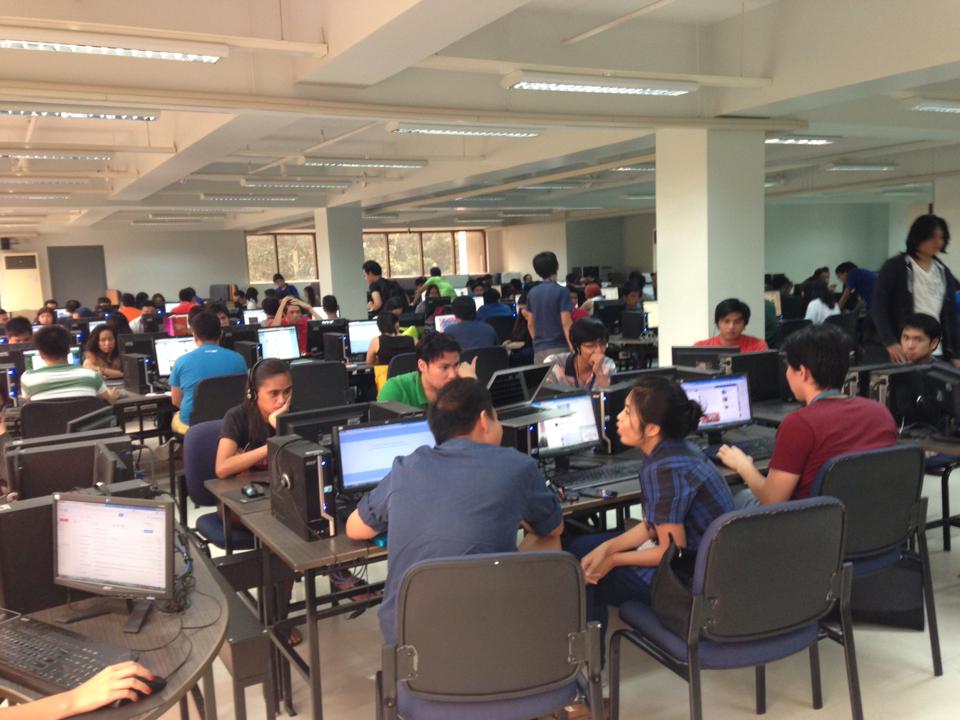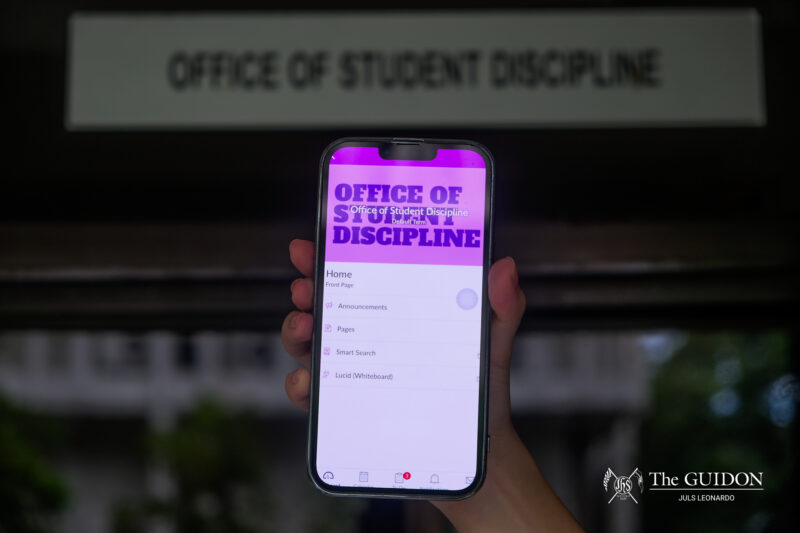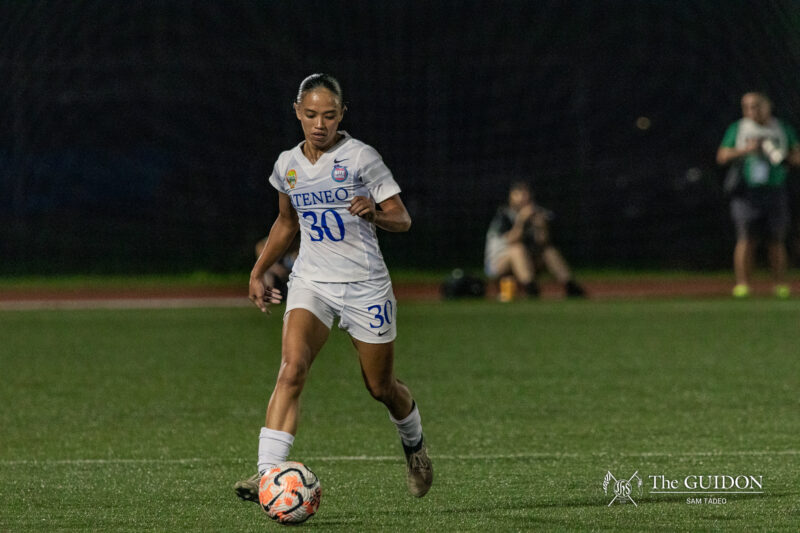CLASS SCHEDULE modules compiled over the years slowed down the Ateneo Integrated Student Information Systems (Aisis) database, causing a disruption of the second semester online enlistment process.
Most seniors and superseniors had difficulty logging into Aisis and getting through to its enlistment page last October 21.
The performance issues resulted in the deferral of online enlistment, moving the original schedule of senior and supersenior enlistment from October 21 to to October 23. The enlistment of the other batches was also adjusted accordingly.
This is the first time such an incident has occurred since enlistment went online in 2007.
Information Systems Group Manager Glenn Año said that the said problems were traced back to the class schedule application, the program that calls the database and displays the class schedule for every query.
Año explained that every time the “Enlist in Class” link was clicked, the class schedule data was loaded, causing server delay.
He said that they needed to fine-tune the class schedule modules because a lot of information has accumulated in the Aisis database over the years.
However, Año clarified that the database did not crash. No data was damaged or changed.
School Registrar Joaquin Agtarap said that rescheduling the enlistment was a correct decision as it gave time for the Office of Management Information System (OMIS) and the Information Technology Resource Management Office (ITRMO) to fix the problem.
Fixing the problem
OMIS and ITRMO tried to debug the system when Aisis was shut down at 10:30 AM on October 21, an hour and a half after the schedule start of enlistment. However, the team had difficulty pinpointing the problem right away.
Año said that they take database performance statistics of every enlistment time in order to monitor the number of times Aisis is accessed and the queries most searched for by students. This semester’s statistics were almost identical with the first semester in that there did not seem to be a system problem.
When initial troubleshooting failed, the postponement of the enlistment gave the team time to revisit the program codes line by line.
“That’s how tedious it was. That’s why we were pressed for time that Monday,” said Año.
Reset unnecessary
With regard to requests to reset the whole enlistment process, Agtarap said they did not think it was necessary to delist those who were able to enlist.
According to him, the idea of Internet registration is based on a first come, first serve policy.
Año explained that a millisecond difference in clicking the Aisis buttons is a huge difference in terms of who gets the resources to access the system first.
“The [students] that got in really were the first. They did not get in because of anything unethical,” said Agtarap.
Although possible, the Registrar’s Office, OMIS and ITRMO, together with then Loyola Schools (LS) Acting Vice President Rudy Ang, decided not to reset, as this would create legal complications for those who already paid their tuition.
Moreover, Agtarap clarified that enlistment was “fair and square” since no second batch students were able to enlist contrary to some reports.
During the enlistment period, social media posts reported that some second batchers were allegedly able to access Aisis and enlist outside their assigned time.
According to Año, they checked their database and no second batcher was able to enlist.
Upon checking the Ateneo Registration Committee’s (Regcom) database, Web Subcommittee Head Marcel Villanueva found out that students who reported the issue mistakenly thought they were second batchers when in fact they were first batchers.
However, there were some first batch students who were able to enlist in their classes from 11:45 AM to 12:00 PM, the time when OMIS opened the Aisis servers to do initial troubleshooting.
Student sentiments
Majority of the students were upset at how long it took for the concerned offices to remedy the problem.
Senior Ryan Nicolas expressed dismay over the incident even if he finished enlisting all but one of his classes by 10:00 AM.
“It wasn’t a surprise to see [Aisis] crash several times and load slowly. My disappointment settled in when things took much longer to get fixed compared to last sem,” he said.
For sophomore Alexandra Medina, although she did not directly experience problems with Aisis, she understood the inconvenience it caused for the seniors and the super seniors.
“We were also affected by the change of schedules. Nonetheless, I am grateful that, come my batch, we did not experience any of the more serious Aisis glitches,” she said.
Two-batch rationale
Despite the problems that have come up since the two-batch enlistment system was implemented last school year, some students believe that this batching system would not be that bad if it was implemented well.
“It’s alright so long as the system does not crash,” said Sanggunian Committee on Academic Affairs Chairperson Larisse Mondok in a mix of English and Filipino.
For senior Regina Teh, the Aisis servers do not seem to be ready for the two-batch system yet.
However, Año said that this enlistment incident could have also happened with the four-batch system.
Agtarap said the switch to the two-batch system was made in response to students’ feedbacks that the four-batch system was “unfair.”
With the four-batch system, some students complained that they had constantly been part of the last batches.
For the two-batch system, random batching is generated during the first semester. If a student belongs to the second batch during the first semester, he or she will be part of the first batch during the next enlistment, and vice versa.
Random batching is also generated for the summer semester.
According to Agtarap and Año, before shifting to the new batching, the Aisis system was upgraded with millions of pesos worth of “additional licenses and additional hardware.”
Meanwhile, Mondok said the Sanggunian was consulted regarding the proposal to change the batching system.
She said that in survey consultations released prior to shifting to a two-batch system, students preferred other methods, including dividing the available slots of classes evenly among the first and second batches.
However, she said such preference was not feasible because the rest of the first batch would run out of their majors or required classes.
In an article that appeared in The GUIDON last year, former Sanggunian Social Sciences Central Board Chairperson Toni Potenciano said that the Sanggunian also pushed for a one-batch system.
A living system
To improve enlistment, many believe that Aisis can still be developed to avoid future performance issues. Año believed that it is “a living system” that constantly evolves.
According to Agtarap, with Ateneo graduates working in the OMIS and ITRMO offices, Aisis-related issues can be resolved, as they have first-hand experience with online enlistment.
To prevent further enlistment issues from happening, a post-registration evaluation is scheduled to be held among the concerned offices, Regcom, and the Sanggunian when LS Vice President John Paul Vergara, PhD returns from his sabbatical leave in January.







